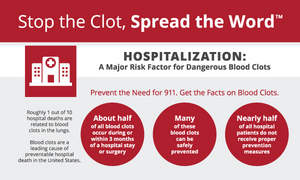VIENNA, VA--(Marketwired - Aug 9, 2016) - The National Blood Clot Alliance (NBCA) and the Centers for Disease Control and Prevention (CDC) are kicking off the next phase of their widely acclaimed Stop the Clot, Spread the Word™ campaign, with an important focus on blood clot risk reduction among hospitalized patients.
Up to 900,000 people are affected by blood clots in the United States each year. About half of these blood clots occur during a hospital stay, or within 90 days of an inpatient hospital admission or surgical procedure, with many diagnosed after discharge. About 100,000 people die due to blood clots each year, which is greater than the annual number of deaths in the U.S. due to AIDS, breast cancer, and motor vehicle crashes combined.
While anyone can develop blood clots, people who are currently or recently hospitalized, recovering from surgery, or receiving cancer treatment are at increased risk.
"Many blood clots can be prevented," explains Coleen A. Boyle, PhD, MSHyg, Director of CDC's National Center on Birth Defects and Developmental Disabilities. "Improving education for both patients and healthcare providers is essential and a key step to saving lives. Increased awareness can protect more patients from developing deadly blood clots and help those who do get treatment sooner."
The Stop the Clot, Spread the Word™ campaign, made possible by funding from CDC to NBCA, is focused on improving recognition of blood clot risks among hospital patients, and also improving awareness of blood clot signs and symptoms. When caught in time, blood clots can be safely treated.
The symptoms of blood clots in the legs (deep vein thrombosis or DVT) include pain, swelling, tenderness, and redness or discoloration of the skin. Symptoms of blood clots in the lungs (pulmonary embolism or PE) include shortness of breath, sharp chest pain that worsens with a deep breath, and coughing up blood.
The newly unveiled Stop the Clot, Spread the Word™ campaign materials encourage people headed to the hospital or just returning home from a hospital stay to ask themselves one potentially life-saving question: What is the plan for blood clot prevention surrounding my hospital stay?
"About 70 percent of blood clots can be prevented, but fewer than 50 percent of hospital patients receive the recommended prevention measures," explains Michael B. Streiff, MD, FACP, Associate Professor of Medicine and Pathology, Johns Hopkins Medical Institutions, Baltimore, Maryland, and Chair of NBCA's Medical & Scientific Advisory Board. "For this reason, people who may be facing a hospital stay should take control of their care and work with their doctors to develop a prevention plan."
According to Dr. Streiff, the best way to prevent blood clots is to increase awareness of risk factors.
While hospitalization, surgery, and trauma are major risk factors for blood clots, several additional risk factors include pregnancy, cancer and some cancer treatments, and the use of estrogen-based birth control and hormone therapy.
"As the leading patient advocacy organization representing people affected by blood clots and clotting disorders nationwide, NBCA has long been focused on the diverse information needs of the many individuals we serve," says NBCA's CEO Randy Fenninger, who is the survivor of blood clots in both lungs. "We're proud of the unparalleled quality of educational resources stemming from our Stop the Clot, Spread the Word™ campaign and honored to continue this important work in partnership with our colleagues at CDC."
NBCA originally developed this five-year awareness initiative in 2014, in response to a CDC Funding Opportunity Announcement, to combine a broad-based public awareness effort with patient-centered educational tools. The campaign seeks to educate the public about blood clot risks, signs, and symptoms, and also is geared toward individuals at increased risk for DVT/PE, including hospitalized patients, pregnant women, and people affected by cancer. Campaign materials for each patient group will be introduced, focusing first on the information needs of hospitalized patients.
NBCA is a nonprofit, voluntary health organization dedicated to advancing the prevention, early diagnosis and successful treatment of life-threatening blood clots, such as deep vein thrombosis, pulmonary embolism, and clot-provoked stroke. NBCA accomplishes its mission through programs that build public awareness, educate patients and healthcare professionals, and promote supportive public and private sector policy.
Please visit www.stoptheclot.org/spreadtheword for more information about blood clots.
Contact Information:
Contact:
NBCA
Lisa Fullam
lfullam@stoptheclot.org
301.825.9217
Sara Wyen
swyen@stoptheclot.org
301.825.9219
CDC Media
404-639-3286
media@cdc.gov
